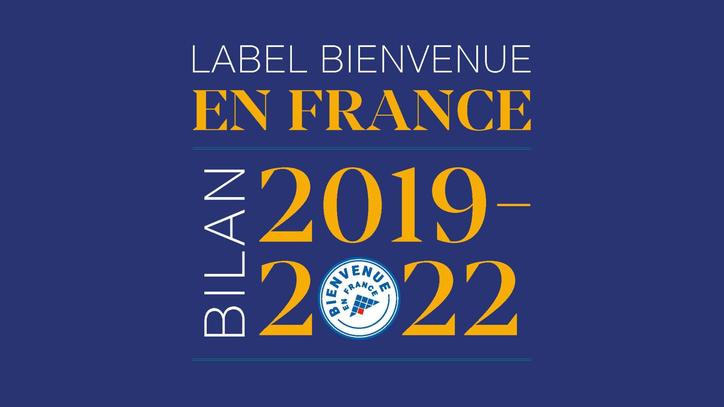
Campus france publishes a report on the "Bienvenue en France" label and announces future developments at its welcome symposium
A key component of the "Bienvenue en France" strategy, the "Bienvenue en France" label currently recognizes 150 institutions of higher education committed to improving the quality of their welcome of international students. At the Welcome Symposium on June 7 & 8, 2023, Campus France presented the results of this initiative, launched in 2018, and announced its future developments.
Les établissements labellisés accueillent les 2/3 des étudiants internationaux en France
Depuis le lancement du label « Bienvenue en France » en novembre 2018, 150 établissements d’enseignement supérieur ont été labellisés entre 2019 et 2023 sur tout le territoire français et outre-mer. Parmi eux, on compte autant d‘universités (34%) que d’écoles d’ingénieurs (34%), et 19% sont des écoles de commerce et de management. Ces établissements labellisés accueillent plus de 65% des étudiants en mobilité diplômante en France.
Il existe trois niveaux de labellisation pour rendre compte de la qualité des dispositifs d’accueil, de 1 à 3 étoiles pour les plus avancés dans la démarche. Sur les 150 établissements labellisés, 33 sont labellisés de niveau 3 (22%), 101 de niveau 2 (67%) et 16 de niveau 1 (11%).
Un premier bilan positif qui conforte l’ancrage du label au sein de l’Enseignement Supérieur et de la Recherche français
L’édition d’un bilan du Label Bienvenue en France 2019-2022 présente un état des lieux des conditions d’accueil pour chacun des cinq champs de référence du Label :
1. Qualité et accessibilité de l’information
84 % des établissements proposent des pages internet spécifiquement conçues pour les étudiants internationaux. La majorité donne des informations détaillées en anglais. Les procédures de candidatures sont très souvent dématérialisées et le suivi administratif est possible en ligne toute l’année.
2. Qualité et accessibilité des dispositifs d’accueil
Près de la moitié des établissements proposent un guichet d’accueil multiservices. Les conventions avec les partenaires locaux et les livrets d’accueil sont d’autres éléments clés. Plus de 9 sur 10 coordonnent les activités d’intégration pour les étudiants internationaux.
3. Accessibilité et accompagnement des enseignements – De nombreux établissements proposent une formation préparatoire et un suivi méthodologique, souvent complétés par des cours de remise à niveau ou de français langue étrangère.
4. Logement et qualité de la vie de campus – Les partenariats pour faciliter la recherche de logement sont nombreux. D’autres bonnes pratiques existent comme l’accueil privilégié des internationaux, les cellules de veille et le services d’accompagnement.
5. Qualité de suivi post-diplômant – Plus de 40 % des établissements mettent en place des dispositifs personnalisés et une véritable culture entrepreneuriale. La plupart se sont dotés d’outils de suivi post-diplômant.
Le Label Bienvenue en France s’est imposé comme un marqueur de qualité pour l’attractivité et le développement international, non seulement pour l’établissement mais également pour l’ensemble de son territoire régional.
Donatienne Hissard – Directrice Générale de Campus France
Il s’inscrit dans une démarche d’amélioration continue qui permet de faire évoluer les pratiques au sein de l’établissement, de développer la sensibilité à l’accueil international et de renforcer l’image positive auprès de nouveaux partenaires extérieurs.
Campus France met à disposition des établissements, des étudiants et des postes diplomatiques des supports de communication et de promotion sur le label Bienvenue en France (kit, flyers, vidéo, …). Il anime également des ateliers lors de la formation des nouveaux responsables d’Espaces Campus France et répond également à toutes leurs demandes sur ce sujet.
2023 : le développement durable rejoint les critères
Le dossier d’auto-évaluation des établissements qui souhaitent s’engager dans la démarche de labellisation va être enrichi d’un 6e champ relatif à l’engagement des établissements pour un développement durable et une responsabilité sociétale (DD&RS), qui veillera à mesurer la qualité et l’accessibilité des dispositifs mis en œuvre pour la mobilisation et la valorisation des étudiants internationaux, l’information et la sensibilisation de ces étudiants aux enjeux environnementaux et sociétaux ainsi que les mesures d’accompagnement vers une transition durable et inclusive orientée vers l’amélioration du bien-être étudiant.
Ce nouveau champ viendra en complément de l’approfondissement des thématiques suivantes : accueil des étudiants en situation de handicap, formation à distance, pratiques sportives, dispositifs d’écoute et de suivi. La durée d’octroi du Label est portée à 5 années dans une logique d’ajustement avec le calendrier quinquennal du HCERES et de la CTI.
Related contents
Recommended News




















































